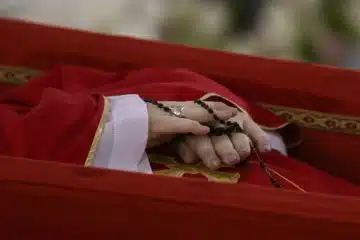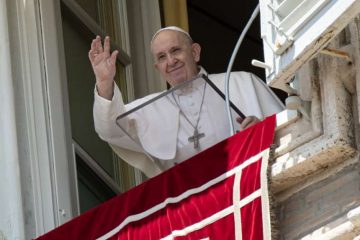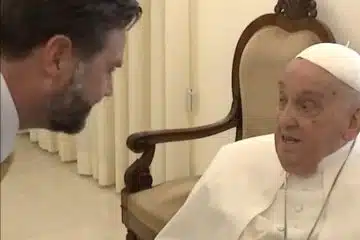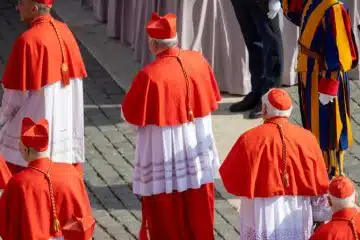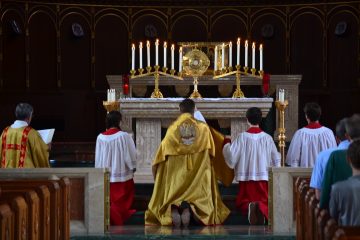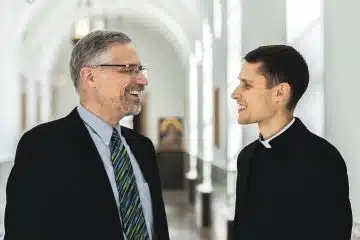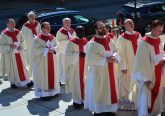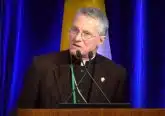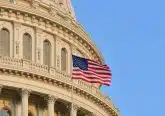U.S. bishops: Vatican declaration does not change Church teaching on marriage
Washington, D.C. Newsroom, Dec 18, 2023 / 18:20 pm
A Vatican-issued declaration on blessing “same-sex couples” and couples in other “irregular situations” does not change the Catholic Church’s teaching that marriage is between a man and a woman, according to a statement issued by the United States bishops.
The Dicastery for the Doctrine of Faith issued a declaration on Monday titled Fiducia Supplicans, which opened the door for priests to pastorally bless same-sex couples. However, the declaration also makes clear that such blessings cannot be performed in a way to resemble marriage and conveyed a distinction between a pastoral blessing and a sacramental blessing.
“The [declaration] articulated a distinction between liturgical (sacramental) blessings and pastoral blessings, which may be given to persons who desire God’s loving grace in their lives,” Chieko Noguchi, the executive director of public affairs at the United States Conference of Catholic Bishops, said in a statement Monday.
“The Church’s teaching on marriage has not changed, and this declaration affirms that, while also making an effort to accompany people through the imparting of pastoral blessings because each of us needs God’s healing love and mercy in our lives,” Noguchi added.
Fiducia Supplicans states that the Church cannot permit a liturgical blessing for same-sex couples because it would “offer a form of moral legitimacy to a union that presumes to be a marriage or to an extra-marital sexual practice.”
Yet, the declaration states that the prohibition on liturgical blessings does not preclude priests from offering “spontaneous” pastoral blessings, which are “meant for everyone.” It adds that such blessings are for those who “do not claim a legitimation of their own status but who beg that all that is true, good, and humanly valid in their lives and their relationships be enriched, healed, and elevated by the presence of the Holy Spirit.”
The document emphasizes that such “spontaneous” pastoral blessings “should not become a liturgical or semi-liturgical act” and “should never be imparted in concurrence with the ceremonies of a civil union, and not even in connection with them” and cannot “be performed with any clothing, gestures, or words that are proper to a wedding.”
Reactions among American Catholics have been mixed, with some members of the clergy praising the new guidelines and others expressing frustration.
Father James Martin, a Jesuit priest, praised the declaration. Martin is the author of the book “Building a Bridge: How the Catholic Church and the LGBT Community Can Enter into a Relationship of Respect, Compassion, and Sensitivity.”
“The declaration opens the door to nonliturgical blessings for same-sex couples, something that had been previously off limits for bishops, priests, and deacons,” Martin said in a post on X, formerly known as Twitter. “Along with many priests, I will now be delighted to bless my friends in same-sex unions.”
Martin referred to the new declaration as a “marked shift” from a 2021 explanatory note in a Responsum from the Congregation for the Doctrine of Faith, which said the Church “does not and cannot bless sin” when questioned about the blessings of same-sex unions. Both the 2021 document and the recent 2023 document were approved by Pope Francis.
In a response to Martin, Father Ronald Vierling posted on X that “the goal of authentic pastoral practice is the conversion of sinners” and that “pastoral outreach must be subordinate to the imitation of Christ the Good Shepherd, whose consistent, unwavering call is to repentance and conversion of life.”
Meanwhile, Stephen P. White, executive director of The Catholic Project at The Catholic University of America, told CNA that the declaration ultimately acknowledges that “God does not and cannot bless sin; but he can and often does bless sinners, particularly when they ask him for the grace to grow in holiness.”
White added that “the DDF warned repeatedly about the necessity of avoiding scandal and confusion” but that “any hopes of avoiding such confusion and scandal seem to have evaporated almost instantly upon publication of the decree.”
“This was entirely predictable: from the wildly misleading press coverage, to the triumphalism from advocates of scrapping the Church’s teaching on sex and marriage, to the insistence from certain corners of the Church that they are now free to do precisely what the decree forbids,” White observed.
Over the past few years, priests in Germany and Belgium have been defying the Vatican’s previous prohibition on blessing same-sex couples. However, many of these blessings still appear to violate the new Vatican guidelines.
In both Belgium and Germany, some bishops have pushed for liturgical-style blessings of individuals in same-sex relationships. The Diocese of Flanders in Belgium approved a liturgy for blessing same-sex couples and the German Synodal Way in Germany openly backed blessing ceremonies for same-sex couples. Both of these practices appear to still be in conflict with the Vatican guidelines.


